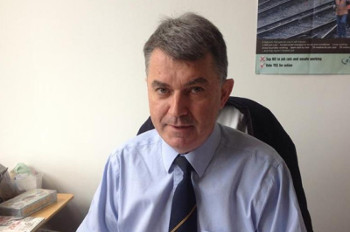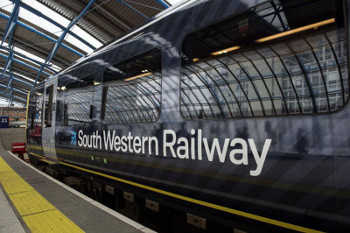With his union involved in protracted disputes over the role of train guards and the outcome of the Williams review eagerly awaited, RMT general secretary Mick Cash tells Transport Network what changes he would most like to see in the rail industry.
Staffing
From RMT’s perspective, the number one priority for the railways has to be to reverse the de-staffing of our trains and stations. One of the succession of rail ministers told the Transport Select Committee recently that the number of staff employed by train operating companies was rising.
What he didn’t say was that frontline staffing levels have failed to keep pace.

Mick Cash
Trains and stations are busier than ever, and staff are at full stretch. Yet under the privatised railway, we’ve seen stations stripped of staff. Only 11% of stations are now staffed at all times.
Around 45% are staffed part time, and in practice this often means only that ticket officers are open for short periods at peak commuter travelling times, many trains do not have a guard making them less safe and accessible for passengers.
Yet passengers are clear this is not what they want. Surveys and reports show that passengers want to see more staff at stations and more staff on trains; 75% of passengers told a recent Survation poll that they would be concerned about the safety of travelling on trains if they no longer had an on-board train guard.
This is not surprising as crime statistics from British Transport Police show both reported violent attacks and sexual assaults on the railway on the rise.
A new approach
However, putting more people on the railways is not enough in itself. We also need to see a completely new approach to employment.
Since privatisation, staffing has been seen as simply a cost to be minimised rather than an asset. When the railways were privatised we lost thousands of skilled railway workers who had worked their way up through the industry, gaining a wealth of experience and tacit knowledge in the process.
The industry likes to talk about training as though it solves all problems. Too often it’s a box ticking exercise and it’s not enough.
Privatisation has seen career paths broken up, whole jobs disappearing or being downgraded and the importation of the mania for outsourcing. The outsourcing of core track maintenance was disastrous and had to reversed but there are still a profusion of sub contactors and zero hour contracts.
The outsourcing of cleaning, catering, security, gateline and other functions is also scandalous and exploitative. We need to see an end to this culture and that means not just a commitment to paying a real living wage but a return to in-house employment and an attempt to rebuild career paths and lay the foundations for a railway that uses its greatest asset rather than sweating it for profit.
Strategy and vision
Finally, we need a new vision of the role that the railways could play in our economy and we have to support that vision with proper, sensibly directed, strategic investment. Rail could be playing a key role in industrial renewal and the fulfilment of our carbon reduction goals, if it was identified as a strategic priority industry.
If we broke with the ‘feast and famine’ funding of Network Rail and provided steady, rolling investment, we could support a programme of track renewal that could help rebuild our steel industry. We could fund a programme of enhancements to electrify the network and build infrastructure to enable a major mode shift from road to rail freight while driving down our own sector’s carbon emissions.

The RMT is in dispute with SWR and others over the role of guards
Unfortunately, RMT has little confidence that these changes can be delivered while the government remains committed to propping up the private sector within the industry’s current structure.
Train operating companies committed to squeezing profits out for their parent companies and turning them into shareholder value are looking to drive their staff costs down rather than investing.
Over the last five years, spending on staff by TOCs has fallen as a percentage of overall expenditure.
Outsourcing is rampant across the network. The funding of Network Rail remains chaotic, electrification has been abandoned and now HS2 has been thrown into question.
Until the rail network is taken out of the hands of the private sector and reassembled into one, single publicly owned company, the barriers to the vision of rail reform sketched out above are likely to be insuperable.
Register now for full access
Register just once to get unrestricted, real-time coverage of the issues and challenges facing UK transport and highways engineers.
Full website content includes the latest news, exclusive commentary from leading industry figures and detailed topical analysis of the highways, transportation, environment and place-shaping sectors.
Use the link below to register your details for full, free access.
Already a registered? Login